Audi Q4 e-tron VS Hyundai IONIQ 6
When comparing the Audi Q4 e-tron and the Hyundai IONIQ 6, the former stands out with its luxurious interior and advanced technology, making it a powerhouse in the compact electric SUV segment. On the other hand, the IONIQ 6 impresses with its sleek design and impressive range, appealing to those seeking a stylish yet practical electric sedan. Both vehicles showcase the growing competition in the electric market, offering unique advantages that cater to different driver preferences.
Audi Q4 e-tron
The Audi Q4 e-tron seamlessly combines sustainable driving with premium comfort, embodying the brand's commitment to electric mobility. Its sleek design and spacious interior create an inviting atmosphere, perfect for those who appreciate both style and practicality. With a focus on innovative technology, the Q4 e-tron offers a dynamic driving experience that appeals to modern drivers seeking eco-friendly alternatives.
detailsHyundai IONIQ 6
The Hyundai IONIQ 6 merges futuristic design with eco-friendly technology, offering a glimpse into the future of electric mobility. Its sleek silhouette and aerodynamic profile are sure to capture attention on the road, while the interior provides a seamless blend of comfort and cutting-edge digital features. With a focus on efficiency and sustainability, this model represents a significant step forward in the evolution of electric vehicles.
detailsAudi Q4 e-tron vs. Hyundai IONIQ 6: A Comprehensive Comparison
In the rapidly evolving world of electric vehicles, the competition continues to intensify as more manufacturers enter the market with compelling models. Two standout contenders are the Audi Q4 e-tron, an SUV that boasts premium quality and performance, and the Hyundai IONIQ 6, a sleek hatchback with innovative features and impressive efficiency. In this comparison, we will delve into the technical aspects and innovations of both models to help you make an informed choice.
Design and Body Type
The Audi Q4 e-tron is characterized by its robust SUV design that exudes a commanding presence on the road. With a length of 4588 mm, a width of 1865 mm, and a height of 1632 mm, it offers a spacious interior and cargo capacity of up to 535 liters. On the other hand, the Hyundai IONIQ 6 presents a more aerodynamic silhouette as a hatchback. Measuring 4855 mm in length and 1880 mm in width, it has a lower height of 1495 mm, making it not only stylish but also efficient in reducing drag.
Power and Performance
When it comes to powertrains, both models offer electric configurations with various power outputs. The Audi Q4 e-tron is available with four power options ranging from 170 HP to a powerful 340 HP. Its torque reaches up to 679 Nm, allowing for impressive acceleration, with the 0-100 km/h sprint achieved in just 5.4 seconds.
The Hyundai IONIQ 6 showcases a slightly different approach with power outputs ranging from 151 HP to 325 HP. Despite having a lower maximum torque of 605 Nm, it also offers remarkable acceleration capabilities, clocking in at just 5.1 seconds for the top variants.
Range and Efficiency
Battery technology plays a critical role in the performance and efficiency of electric vehicles. The Q4 e-tron is equipped with a battery capacity of 52 kWh or 77 kWh, providing an electric range between 351 km and an impressive 554 km, depending on the configuration. Its consumption rates are quite competitive, ranging from 15.9 kWh/100km to 17.4 kWh/100km.
In contrast, the IONIQ 6 shines with outstanding efficiency, offering electric ranges from 429 km to 614 km. The consumption figures are particularly impressive, with rates as low as 13.9 kWh/100 km. This makes the IONIQ 6 one of the most efficient electric vehicles on the market, an advantage for eco-conscious drivers seeking sustainability without sacrificing performance.
Driving Dynamics and Innovation
Both the Audi Q4 e-tron and Hyundai IONIQ 6 feature automatic transmissions with reduction gearboxes, enhancing driving dynamics. The Q4 e-tron is available in both rear-wheel drive and all-wheel drive configurations, offering versatility in handling and traction. The all-wheel-drive variant delivers a top speed of 180 km/h.
The IONIQ 6, with its rear-wheel drive and all-wheel drive options, reaches a top speed of 185 km/h. Hyundai has integrated innovative technology in the IONIQ 6, including Smart Regenerative Braking and sophisticated connected car features, making it a strong contender for tech-savvy consumers.
Interior and Comfort
Inside the cabin, the Audi Q4 e-tron emphasizes luxury and comfort, featuring high-quality materials and spacious seating for five passengers. The rear passenger space and trunk capacity provide ample room for daily commutes and long trips alike.
Meanwhile, the IONIQ 6 impresses with its modern interior, blending sustainability and innovation. It includes eco-friendly materials while maintaining comfort for five occupants. Despite its hatchback design, the trunk capacity of 401 liters is practical for various needs.
Conclusion: Which One Should You Choose?
Choosing between the Audi Q4 e-tron and the Hyundai IONIQ 6 ultimately depends on personal preferences and priorities. If you value luxury, performance, and an SUV body type, the Q4 e-tron is a formidable contender. However, if you prioritize efficiency, advanced technology, and modern design in a hatchback, the IONIQ 6 stands out as an exemplary choice. Both vehicles represent significant strides in the electric vehicle market and offer compelling options for eco-minded consumers.
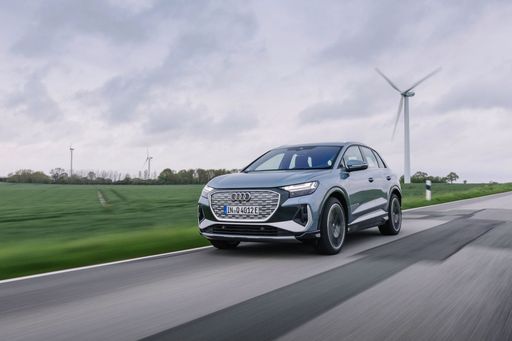 @ audi-mediacenter.com
@ audi-mediacenter.com
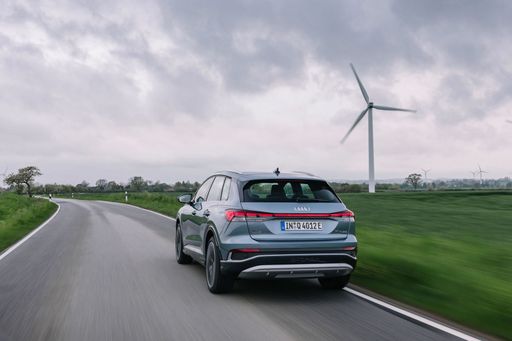 @ audi-mediacenter.com
@ audi-mediacenter.com
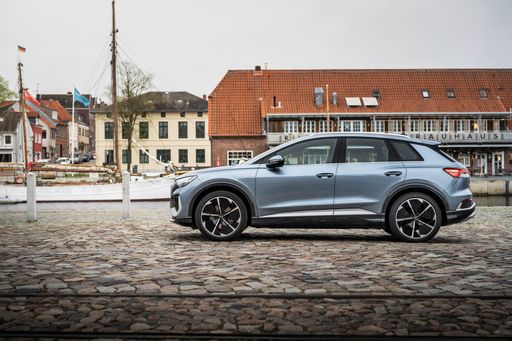 @ audi-mediacenter.com
@ audi-mediacenter.com
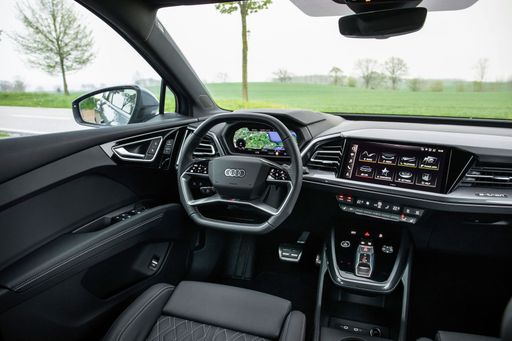 @ audi-mediacenter.com
@ audi-mediacenter.com
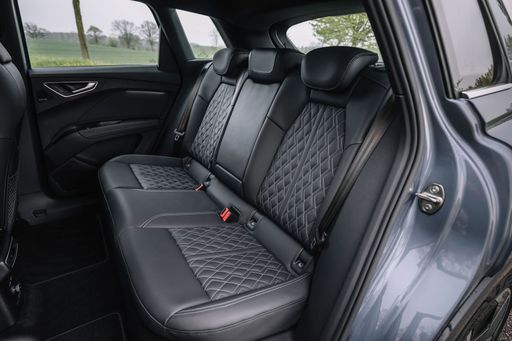 @ audi-mediacenter.com
@ audi-mediacenter.com
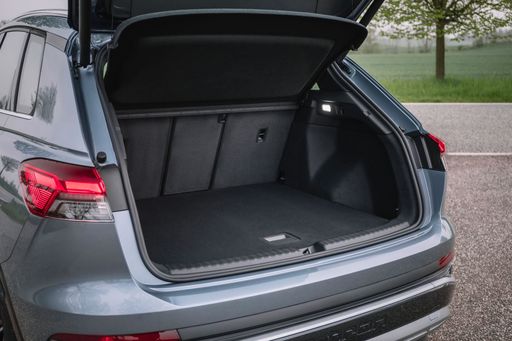 @ audi-mediacenter.com
@ audi-mediacenter.com
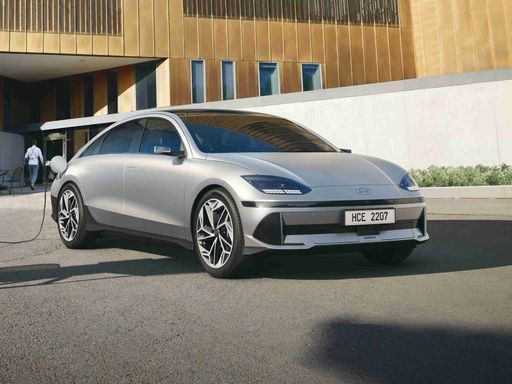 @ hyundai.news
@ hyundai.news
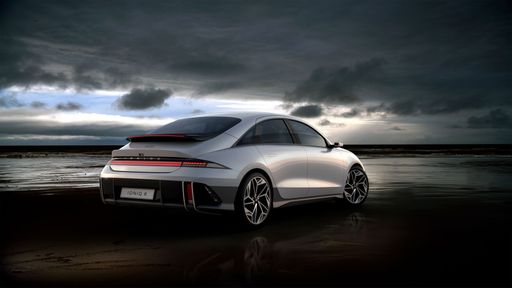 @ hyundai.news
@ hyundai.news
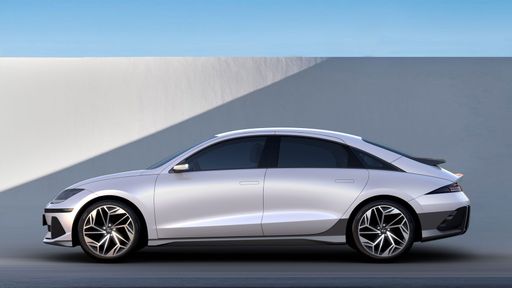 @ hyundai.news
@ hyundai.news
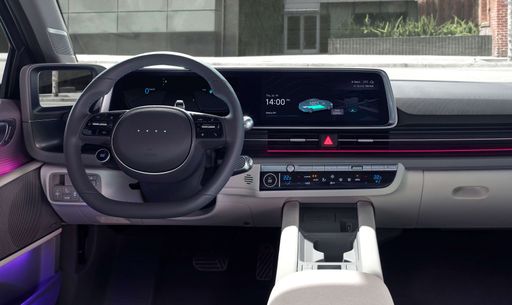 @ hyundai.news
@ hyundai.news

|

|
|
|
|
Costs and Consumption |
|
|---|---|
|
Price
about 42200 - 63400
$
|
Price
about 40600 - 59300
$
|
|
Consumption L/100km
-
|
Consumption L/100km
-
|
|
Consumption kWh/100km
15.9 - 17.4
kWh
|
Consumption kWh/100km
13.9 - 15.1
kWh
|
|
Electric Range
350 - 554
km
|
Electric Range
429 - 614
km
|
|
Battery Capacity
52 - 77
kWh
|
Battery Capacity
53 - 77.4
kWh
|
|
co2
0
g/km
|
co2
0
g/km
|
|
Fuel tank capacity
-
|
Fuel tank capacity
-
|
Dimensions and Body |
|
|
Body Type
SUV
|
Body Type
Hatchback
|
|
Seats
5
|
Seats
5
|
|
Doors
5
|
Doors
4
|
|
Curb weight
1990 - 2235
kg
|
Curb weight
1850 - 2095
kg
|
|
Trunk capacity
520 - 535
L
|
Trunk capacity
401
L
|
|
Length
4588
mm
|
Length
4855
mm
|
|
Width
1865
mm
|
Width
1880
mm
|
|
Height
1614 - 1632
mm
|
Height
1495
mm
|
|
Payload
510 - 515
kg
|
Payload
425 - 430
kg
|
Engine and Performance |
|
|
Engine Type
Electric
|
Engine Type
Electric
|
|
Transmission
Automatic
|
Transmission
Automatic
|
|
Transmission Detail
Reduction Gearbox
|
Transmission Detail
Reduction Gearbox
|
|
Drive Type
Rear-Wheel Drive, All-Wheel Drive
|
Drive Type
Rear-Wheel Drive, All-Wheel Drive
|
|
Power HP
170 - 340
HP
|
Power HP
151 - 325
HP
|
|
Acceleration 0-100km/h
5.4 - 9
s
|
Acceleration 0-100km/h
5.1 - 8.8
s
|
|
Max Speed
160 - 180
km/h
|
Max Speed
185
km/h
|
|
Torque
310 - 679
Nm
|
Torque
350 - 605
Nm
|
|
Number of Cylinders
-
|
Number of Cylinders
-
|
|
Power kW
125 - 250
kW
|
Power kW
111 - 239
kW
|
|
Engine capacity
-
|
Engine capacity
-
|
|
Top speed
160 - 180
km/h
|
Top speed
185
km/h
|
General |
|
|
Model Year
2023 - 2024
|
Model Year
2022
|
|
CO2 Efficiency Class
A
|
CO2 Efficiency Class
A
|
|
Brand
Audi
|
Brand
Hyundai
|
Audi Q4 e-tron
Introducing the Audi Q4 e-tron: The Future of Electric Mobility
The Audi Q4 e-tron marks a significant leap forward in the world of electric vehicles, combining luxury, performance, and cutting-edge technology into one dynamic package. As part of Audi's e-tron family, this SUV not only offers a sustainable alternative to traditional fuels but does so with the unmistakable elegance and comfort that the brand is renowned for.
Engine and Performance: Power Meets Efficiency
The Q4 e-tron is available in various configurations, showcasing Audi's commitment to offering choices suited to different driving styles and needs. With power outputs ranging from 170 PS to 340 PS, the Q4 e-tron allows enthusiasts and casual drivers alike to enjoy a spirited driving experience.
One of the standout features of the Q4 e-tron is its efficient energy consumption. Models achieve consumption figures as low as 15.9 kWh/100 km, enabling impressive ranges of up to 554 km on a single charge. This makes the Q4 e-tron not only a competent urban commuter but also a capable vehicle for longer journeys. The acceleration from 0-100 km/h varies between 5.4 and 9 seconds, depending on the configuration, allowing drivers to enjoy a thrilling performance without compromising on efficiency.
Battery Technology: Powering the Future
Equipped with a battery capacity ranging from 52 kWh to 77 kWh, the Audi Q4 e-tron features impressive charging capabilities. The intelligent battery management system optimally uses the stored energy, balancing performance with efficiency. This innovative approach ensures that owners can maximise the electric range without the need for frequent recharges.
Innovative Interior and Technology
Inside the Audi Q4 e-tron, luxurious materials and modern design come together seamlessly. The spacious cabin is designed for five passengers, offering ample legroom and luggage space of 520 to 535 litres, making it practical for everyday use. The digital cockpit, complete with a high-resolution display, provides essential information at a glance, while the intuitive infotainment system seamlessly integrates with smartphones for an enhanced connectivity experience.
Sustainability and Driving Dynamics
Sustainability is at the core of the Audi Q4 e-tron's design. The vehicle not only produces zero emissions but also incorporates recycled materials in its manufacturing processes, showcasing Audi's commitment to eco-friendly production. Furthermore, with optional all-wheel drive capabilities available, the Q4 e-tron ensures excellent traction and stability, regardless of road conditions, making every drive enjoyable and secure.
Conclusion: A Symbol of Electric Elegance
The Audi Q4 e-tron epitomises the brand's drive towards a more sustainable future while maintaining the performance and luxury that customers expect. With its diverse range of configurations, advanced technology, and commitment to efficiency, the Q4 e-tron is not just another electric vehicle—it's a bold statement in automotive innovation. As we move forward, this vehicle is set to become a benchmark in the electric SUV segment, offering an exemplary blend of comfort, performance, and technology.
Hyundai IONIQ 6
Introducing the Hyundai IONIQ 6: A New Era of Electric Mobility
The Hyundai IONIQ 6 is more than just a car; it's a glimpse into the future of electric mobility. With cutting-edge technology, impressive performance, and a sustainable design, this vehicle stands as a beacon for the automotive industry's electric revolution. Let's delve into what makes the IONIQ 6 a standout choice in the rapidly growing electric vehicle market.
Performance and Power: The Heart of the IONIQ 6
The Hyundai IONIQ 6 offers two battery options – a 53 kWh version and a more powerful 77.4 kWh variant. Depending on the configuration, drivers can experience a power output ranging from 151 PS to a remarkable 325 PS, highlighting the versatility of this model. With a maximum torque of up to 605 Nm, acceleration from 0-100 km/h is achieved in just 5.1 to 8.8 seconds, catering to both efficiency enthusiasts and those with a penchant for speed.
Efficiency and Range: Long Journeys Made Easy
One of the IONIQ 6's standout features is its exceptional range. Offering an electric range between 429 km to an impressive 614 km on a single charge, it's designed to go the distance. Efficiency is at the forefront, with energy consumption between 13.9 kWh/100km and 15.1 kWh/100km, ensuring that your driving experience remains as eco-friendly as it is enjoyable. All variants boast a CO2 efficiency class of A, reflecting Hyundai's commitment to sustainability.
Design and Interior: Luxury Meets Sustainability
The IONIQ 6's sleek, aerodynamic design is not only visually stunning but also functional, reducing air resistance to maximise efficiency. Offering a hatchback style, it comfortably seats five, ensuring ample space for passengers and luggage. The interior is crafted with sustainable materials, combining advanced technology with an eco-conscious ethos. With a boot capacity of 401 litres, it seamlessly balances practicality with style.
Technology and Innovation: Driving into the Future
Packed with the latest automotive technologies, the IONIQ 6 integrates the future of driving with present-day conveniences. It features a state-of-the-art automatic transmission with a reduction gearbox that ensures smooth driving dynamics. Its advanced driver assistance and safety systems provide peace of mind on every journey, making it an ideal choice for progressive drivers who embrace technology.
Conclusion: A Competitively Priced Electric Option
The Hyundai IONIQ 6 offers an enticing blend of performance, range, and sustainability. With prices ranging from €43,900 to €64,200, it represents excellent value for an electric vehicle of its calibre. Monthly costs are competitively set between €1066 to €1379, while cost per km ranges between 42.7 to 55.2 cents, appealing to cost-conscious customers without compromising on quality or innovation. The IONIQ 6 is a triumph of modern engineering, making it a strong contender in the electric vehicle market.
